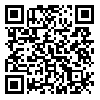Volume 28, Issue 3 (10-2022)
Back to this Issue |
Back to browse issues page
Download citation:
BibTeX | RIS | EndNote | Medlars | ProCite | Reference Manager | RefWorks
Send citation to:



BibTeX | RIS | EndNote | Medlars | ProCite | Reference Manager | RefWorks
Send citation to:
Gholami Alavi H, Rezaei M, Dianati M, Atoof F. The effect of Thi Chi Chuan exercise on the balance status of elderly men: A randomized controlled clinical trial. Journal of Hayat 2022; 28 (3) :296-309
URL: http://hayat.tums.ac.ir/article-1-4639-en.html
URL: http://hayat.tums.ac.ir/article-1-4639-en.html
1- Dept. of Geriatric Nursing, School of Nursing and Midwifery, Kashan University of Medical Sciences, Kashan, Iran
2- Autoimmune Disease Research Center, Kashan University of Medical Sciences, Kashan, Iran
3- Dept. of Medical Surgical Nursing, School of Nursing and Midwifery, Kashan University of Medical Sciences, Kashan, Iran; Trauma Nursing Research Center, Kashan University of Medical Sciences, Kashan, Iran ,mandianati@gmail.com
4- Department of Epidemiology and Biostatistics, School of Health, Kashan University of Medical Sciences, Kashan, Iran
2- Autoimmune Disease Research Center, Kashan University of Medical Sciences, Kashan, Iran
3- Dept. of Medical Surgical Nursing, School of Nursing and Midwifery, Kashan University of Medical Sciences, Kashan, Iran; Trauma Nursing Research Center, Kashan University of Medical Sciences, Kashan, Iran ,
4- Department of Epidemiology and Biostatistics, School of Health, Kashan University of Medical Sciences, Kashan, Iran
Abstract: (1162 Views)
Background & Aim: Imbalance and risk of falling is one of the most common problems in the elderly. Various interventions have been suggested in order to improve the elderly’s physical performance and balance. The aim of the present study was to determine the effect of Tai Chi Chuan exercise on the balance status of elderly men.
Methods & Materials: In this clinical trial study, 40 elderly men referred to Golabchi health center in Kashan in 2021 were selected by the convenience sampling. Using blocked randomization with the block size of four, they were assigned into intervention or control groups. First, the balance status of the participants was assessed by Fullerton test. The maximum score of this test is 40 and has a direct relationship with the quality of the balance state. Then, the Tai Chi Chuan exercises were performed in the intervention group for 20 sessions of 30-40 minutes. The control group continued their routine visits. Two weeks after the intervention, the balance test was performed again. To compare the demographic variables between the two groups, t-test and Chi-square tests or their non-parametric equivalents were used. ANCOVA test was used to compare the balance status between the two groups using the SPSS software version 20. The significance level was considered less than 0.05.
Results: The results showed the two groups were not significantly different in demographic variables. Although the comparison of the median of two groups before the intervention had no statistically significant difference (P=0.988), ANCOVA showed that considering the scores before the intervention as a covariate, the Fullerton scores after the intervention were significantly higher than those of the control group (P<0.001).
Conclusion: This study showed that Tai Chi Chuan exercises can improves the balance of the elderly men, and its use is recommended for elderly patients to reduce the possibility of falling and related problems.
Clinical trial registry: IRCT20200108046058N1
Methods & Materials: In this clinical trial study, 40 elderly men referred to Golabchi health center in Kashan in 2021 were selected by the convenience sampling. Using blocked randomization with the block size of four, they were assigned into intervention or control groups. First, the balance status of the participants was assessed by Fullerton test. The maximum score of this test is 40 and has a direct relationship with the quality of the balance state. Then, the Tai Chi Chuan exercises were performed in the intervention group for 20 sessions of 30-40 minutes. The control group continued their routine visits. Two weeks after the intervention, the balance test was performed again. To compare the demographic variables between the two groups, t-test and Chi-square tests or their non-parametric equivalents were used. ANCOVA test was used to compare the balance status between the two groups using the SPSS software version 20. The significance level was considered less than 0.05.
Results: The results showed the two groups were not significantly different in demographic variables. Although the comparison of the median of two groups before the intervention had no statistically significant difference (P=0.988), ANCOVA showed that considering the scores before the intervention as a covariate, the Fullerton scores after the intervention were significantly higher than those of the control group (P<0.001).
Conclusion: This study showed that Tai Chi Chuan exercises can improves the balance of the elderly men, and its use is recommended for elderly patients to reduce the possibility of falling and related problems.
Clinical trial registry: IRCT20200108046058N1
Send email to the article author
| Rights and permissions | |
 |
This work is licensed under a Creative Commons Attribution-NonCommercial 4.0 International License. |







